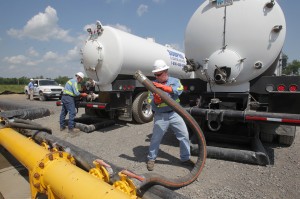Report Shows Texas Counties Where Fracking and Water Needs Collide

Mike Cardew/Akron Beacon Journal/MCT
Tom Bragg, left, of Sunpro Inc., works on finishing filling his truck with water as Gary Wortman takes off the filler hose from his truck after filling up with water at a Chesapeake Energy Corporation fresh water collection station at a sand and gravel pit, May 31, 2012, in Carroll County, Ohio.
The Texas legislature is currently considering plans to fund water projects for the state. Meanwhile, the oil and gas industry is using billions of gallons of freshwater for fracking, which is getting the attention of lawmakers.
Virginia Palacios, a research associate at the Environmental Defense Fund, has a new analysis showing that many of the Texas counties currently facing water shortages are also slated to have oil and gas development in the coming years.
Palacios collected data from UT’s Bureau of Economic Geology on mining water use and oil and gas water use. She compared that data with projections on county water use by sector by the Texas Water Development Board to determine whether each county’s water supply could fulfill demand. She found that in 12 Texas counties, freshwater use by the oil and gas industry “made up at least 25 percent of overall county-wide demand in 2011.”

Environmental Defense Fund
A researcher at the Environmental Defense Fund determined which counties should be highest priority with water conservation in oil production.
Palacios called the oil and gas industry a “prime candidate for reducing its reliance on freshwater” and said using brackish water could be a good alternative—if some precautions are taken.
Among her findings:
- “The majority of water used for Texas oil and gas development in 2011 was in 13 counties, ten of which currently have water restrictions in place.”
- In five counties, 100 percent of the water deficit projected for 2020 can be met by cutting oil and gas water use by half.
“I think that you have to be careful in considering where your waste stream is going,” Palacios says. “You have to have strong rules and oversight in transportation, especially with [brackish water] because it can be more dangerous.”
There are efforts underway by drillers, regulators and lawmakers to encourage more recycling of water in fracking and the use of brackish groundwater. But recycling wastewater remains expensive for drillers, and relatively rare.
The EDF says it is working on solutions to improve efficiency for water use and energy production because, as Palacios says, the two are interdependent.
“It requires energy to produce water, and it also requires water to produce energy,” she says. “So both are connected.”*

